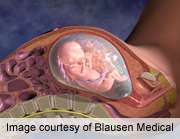Multiple-child pregnancies hike birth costs in the US

(HealthDay)—Compared with singleton births, delivery of multiple-child pregnancies substantially raises health care costs paid by insurers and patients in the United States, according to research published in the December issue of the American Journal of Obstetrics & Gynecology.
Elkin V. Lemos, M.D., Ph.D., of the University of the Sciences in Philadelphia, and colleagues used claims data for women with live births from 2005 to 2010 to assess the costs associated with multiple-child and single-child births.
The researchers found that, of 437,924 deliveries, 97.02 percent were singletons, 2.85 percent were twins, and 0.13 percent were triplets or more. Compared with women with single-child pregnancies, women with multiple-child pregnancies had significantly higher rates of localized and systemic comorbid conditions. Twins and triplets or more were significantly more likely than singletons to have spent time in a neonatal intensive care unit. Adjusted total all-cause health care cost of delivery averaged $21,458 for singletons, $104,831 for twins, and $407,199 for triplets or more.
"Pregnancies with the delivery of twins cost approximately five times as much when compared with singleton pregnancies; pregnancies with delivery of triplets or more cost nearly 20 times as much," the authors write.
Several authors disclosed financial ties to Merck.
More information:
Abstract
Full Text
Copyright © 2013 HealthDay. All rights reserved.















